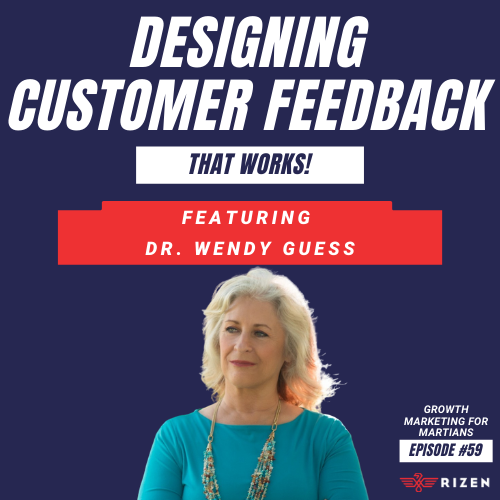Dr. Wendy Guess, a Teaching Professor of Marketing and Logistics at Florida International University, stops by to discuss her essential elements of interaction regarding business interaction with customers. We also discuss how to build customer feedback surveys that actually get results!
Episode Markers
- 1:06 - Dr. Guess’s Background
- 2:39 - How customer behavior COULD change Post-COVID
- 5:50 -The Essential Elements of Interaction w/ Customers
- 9:48 - Why PLANNING is Crucial When Communicating w/ Customers
- 15:38 - How to plan a useful survey
- 22:50 - Tools for designing and analyzing surveys
- 28:16 - tips for new marketers when starting out
- 32:10 - How to connect w/ Dr. Guess
How to Connect w/ Dr. Guess
Show Excerpts
1) Dr. Guess's overview of your background in business and marketing
Dr. Guess has an eclectic background in promotion/event planning, anthropology and communication, wellness and dance, behavioral sciences, and teaching marketing at FIU.
2) Her philosophy of "the essential elements of interaction" regarding business interaction with customers
"From my background in anthropology I learned that every culture/tribe/city has ways of seeing the world and engaging/communicating with each other."
- From ballroom/social/folk dance she learned the silent language of communication, expectation of roles, etc.
- From wellness/fitness she learned about the body interacting with the mind and spirit.
- She realized there are universal themes for living - and called this "Elements of Interaction."
- We need to create, connect, and master our world, our work, and our inner self
- Create meaning and order
- Connect - network, build rapport, create community
- Master - yourself, your inner dialogue, and your motivations
- These human principles are also used in UX design concepts!
3) Defining “predictive communication” and why marketers should take it to heart when connecting with their customers.
Dr. Guess started using the term "Predictive Communication" while considering the predictive analytics concept.
- She was frustrated spending too much time answering the same emails over and over
- We all receive too much unrelated emails and an overload of info at the same time
- No reminders - send smaller chunks of info instead
- When info is sent in a timely manner - it produces better results
- What to consider:
- What am I really delivering?
- How do they really feel about it - survey?
- What do they really need to know about product/service?
- When do they really need this info?
4) Why it's important to determine the research method when designing a customer feedback survey
- What kind of info are you really trying to gather?
- Do you want to rate something (quantitative)
- Do you want to get insights (qualitative)
- Do you need a focus group to learn deeper
5) Best practices when it comes to designing surveys customers will actually want to take part in
- Be clear on what you really want to know and WHY (especially with customer service satisfaction) ex: do you want a popularity rating or do you want to know if they’ll buy again, or how they use product, ideas from customers, where they want to find info, where they hang out socially, etc.
- Stay with one or two topics per survey
- Keep questions on one subject - determine best rating scale for each type of info
- Make sure answer choices are applicable and lead you to desired info
- Ask questions from clients’ perspective and not company internal lingo
- What surveys are NOT: performance based indicators for sales staff $$$
6) Pieces of software for building, collecting, and analyzing surveys
- Google Forms - free, basic questions, responses all combined
- SoGoSurvey - free, flexible
- Survey Monkey - paid, useful for many biz related questions
- Qualtrics - comprehensive, academic and lots of features like skip logic, etc. visual data
- SPSS - additional analytics statistical tools (what the academic researchers use)


No Comments Yet
Let us know what you think